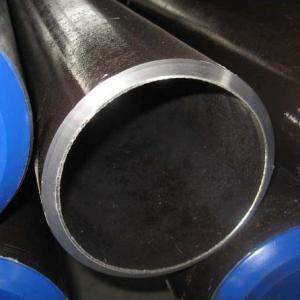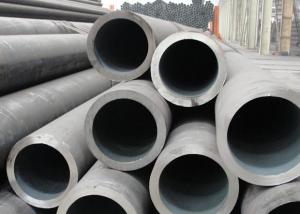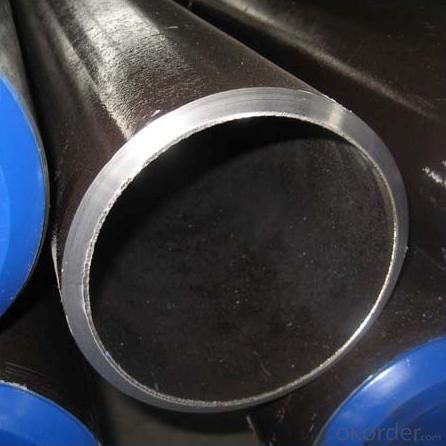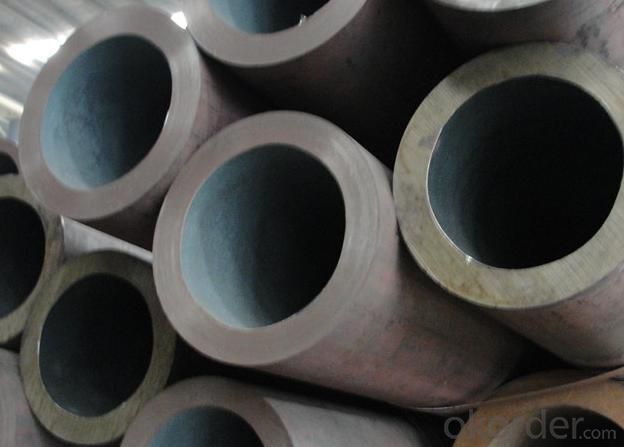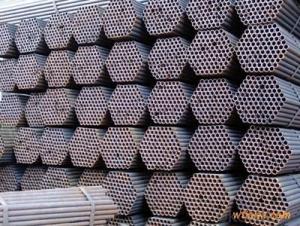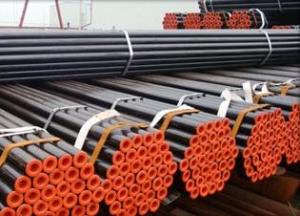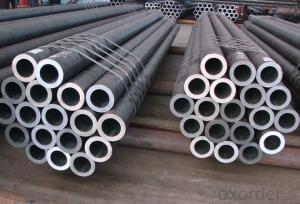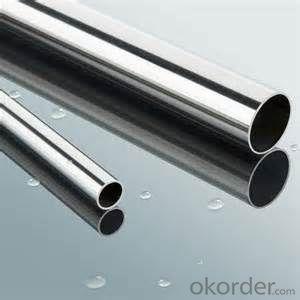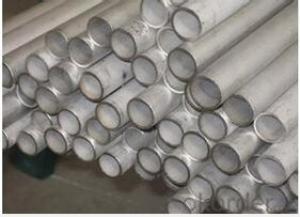Seamless Steel Tubes For Hydraulic Pillar Service
- Loading Port:
- China Main Port
- Payment Terms:
- TT or LC
- Min Order Qty:
- 20mt m.t.
- Supply Capability:
- 5000 Tons Per Month m.t./month
OKorder Service Pledge
OKorder Financial Service
You Might Also Like
Specifications of Seamless Steel Tubes For Hydraulic Pillar Service
1) OD: 1/2''---24'' WT : SCH5 ------SXH XXS
2) shortest time delivery
3)API and ISO
4) IN STOCK
Usages of Seamless Steel Tubes For Hydraulic Pillar Service
It can be used for transmitting a large number of fluid. Such as oil, natural gas, water and some solid materials. At the same time it can be widely used as the manufacture of various structural parts and mechanical parts,as well as building construction.
Package of Seamless Steel Tubes For Hydraulic Pillar Service
Packaging/Delivery Wrapped in bundles with steel strips or according to customers' requirements
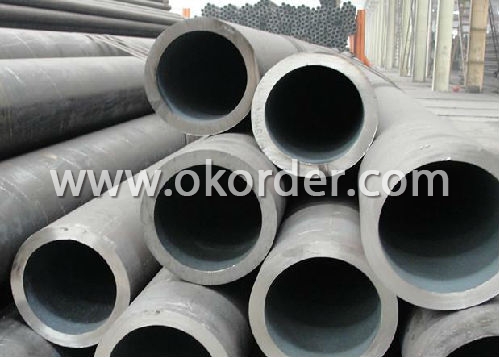
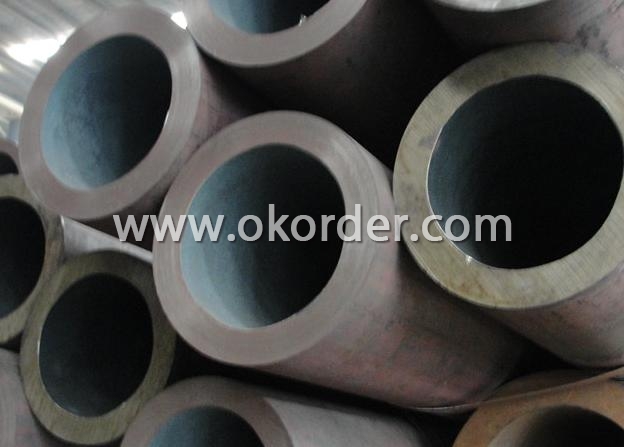
- Q: Can steel pipes be threaded?
- Yes, steel pipes can be threaded. Threading is a common process used to create screw-like ridges on the ends of the steel pipes, allowing them to be easily connected to fittings or other pipes.
- Q: How are steel pipes protected against mechanical damage during transportation?
- Steel pipes are protected against mechanical damage during transportation through various methods such as using protective coatings, wrapping them with foam or other cushioning materials, securing them with straps or bands, and using appropriate packaging techniques to minimize impact and vibration.
- Q: What is the shear strength of steel pipes?
- The shear strength of steel pipes can vary depending on various factors such as the grade and thickness of the steel, as well as the manufacturing process and any additional treatments or coatings applied. In general, steel pipes have a high shear strength due to the inherent strength of steel as a material. The shear strength is typically determined through testing and can range from 50,000 to 80,000 pounds per square inch (PSI) for common grades of steel pipes. However, it is important to note that the shear strength can be significantly higher for specialized or higher-grade steel pipes designed for specific applications such as offshore drilling or high-pressure systems. Therefore, it is advisable to consult the manufacturer's specifications or engineering standards for accurate and specific shear strength values for a particular steel pipe.
- Q: Can steel pipes be used for mining applications?
- Yes, steel pipes can be used for mining applications. Steel pipes are known for their strength, durability, and resistance to extreme conditions, making them suitable for various mining activities such as transporting water, air, or chemicals, as well as for structural support and ventilation systems in mines.
- Q: What are the different types of coatings used for steel pipes?
- There are several different types of coatings used for steel pipes, including epoxy coatings, polyethylene coatings, coal tar enamel coatings, and zinc coatings.
- Q: Can steel pipes be used for electrical conduits?
- No, steel pipes are not suitable for use as electrical conduits. Electrical conduits are typically made of materials such as PVC (polyvinyl chloride) or metal conduits specifically designed for electrical applications.
- Q: How are steel pipes used in underground drainage systems?
- Steel pipes are commonly used in underground drainage systems due to their durability and strength. They are used to transport wastewater, stormwater, and other liquids away from buildings and infrastructure to a designated discharge point. The steel pipes provide a reliable and long-lasting solution, ensuring the efficient flow of water and preventing any potential leaks or damage to the surrounding environment.
- Q: What are the common methods for inspecting the condition of steel pipes?
- There are several common methods for inspecting the condition of steel pipes. These methods aim to identify any defects or potential issues that could affect the integrity of the pipes. 1. Visual Inspection: This involves a thorough visual examination of the pipes to identify any visible signs of damage such as corrosion, cracks, or leaks. Inspectors may use tools such as flashlights, mirrors, or borescopes to access hard-to-reach areas. 2. Ultrasonic Testing: This method uses high-frequency sound waves to detect defects within the steel pipes. A transducer is used to emit sound waves, and any disruptions or reflections in the waves can indicate potential issues such as cracks or thinning of the pipe walls. 3. Magnetic Particle Testing: This technique is primarily used to detect surface cracks or defects in steel pipes. A magnetic field is applied to the pipe, and fine iron particles are then applied to the surface. The particles will gather at any areas where there are surface defects, making them easily visible. 4. Eddy Current Testing: This non-destructive testing method is used to detect surface and near-surface defects in steel pipes. It involves passing an alternating current through a coil, which induces eddy currents in the pipe. Any disruptions or changes in the eddy currents can indicate defects such as corrosion or cracks. 5. Radiographic Testing: This method uses X-rays or gamma rays to inspect the internal structure of steel pipes. X-ray film or a digital detector is placed on one side of the pipe, while the X-ray source is placed on the other side. The rays penetrate the steel, and any irregularities or defects can be identified on the film or through digital imaging. 6. Dye Penetrant Inspection: This technique is used to detect surface-breaking defects in steel pipes. A dye penetrant is applied to the surface of the pipe, and after a specified period, a developer is used to draw out the dye from any defects. The dye will make the defects easily visible. These methods, either individually or in combination, provide a comprehensive inspection of steel pipes, ensuring their reliability and safety in various industries such as oil and gas, construction, and manufacturing.
- Q: What is PE coated steel pipe? Seek explanation
- The appearance of the native HDPE is milky white and is somewhat translucent in the narrow cross section. PE has excellent properties that are resistant to most life and industrial chemicals. Polyethylene (PE) pipe due to its unique advantages and is widely used in building water supply, drainage, underground drainage pipe, building heating, gas pipelines, electrical and telecommunications, industrial protective casing pipes, agricultural pipes etc.. The utility model is mainly used for urban water supply, urban gas supply and farmland irrigation.
- Q: How are steel pipes used in the manufacturing of agricultural machinery and equipment?
- Steel pipes are commonly used in the manufacturing of agricultural machinery and equipment due to their strength, durability, and versatility. These pipes are used for various purposes such as forming the structural framework, creating hydraulic systems, and providing conduits for fluid and air transportation. Whether it's for building tractor chassis, constructing irrigation systems, or manufacturing grain storage equipment, steel pipes play a crucial role in ensuring the reliability and efficiency of agricultural machinery.
1. Manufacturer Overview
| Location | Wuxi, China |
| Year Established | 1991 |
| Annual Output Value | 300,000Tons |
| Main Markets | Europe; Southeast Asia; etc. |
| Company Certifications | API 5L;API 5CT;API Q1;ISO/TS29001 |
2. Manufacturer Certificates
| a) Certification Name | |
| Range | |
| Reference | |
| Validity Period |
3. Manufacturer Capability
| a) Trade Capacity | |
| Nearest Port | Wuxi; Shanghai |
| Export Percentage | 41% - 50% |
| No.of Employees in Trade Department | 3900-4000 People |
| Language Spoken: | English; Chinese; Spanish |
| b) Factory Information | |
| Factory Size: | Above 450,000 square meters |
| No. of Production Lines | Above 10 |
| Contract Manufacturing | OEM Service Offered;Design Service Offered |
| Product Price Range | Average |
Send your message to us
Seamless Steel Tubes For Hydraulic Pillar Service
- Loading Port:
- China Main Port
- Payment Terms:
- TT or LC
- Min Order Qty:
- 20mt m.t.
- Supply Capability:
- 5000 Tons Per Month m.t./month
OKorder Service Pledge
OKorder Financial Service
Similar products
Hot products
Hot Searches
Related keywords
